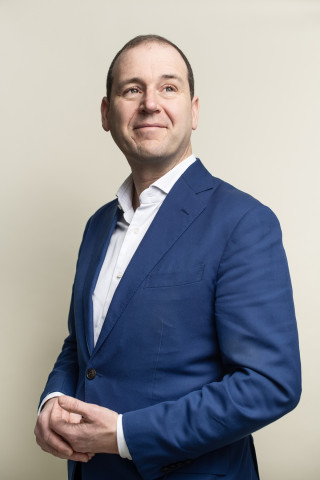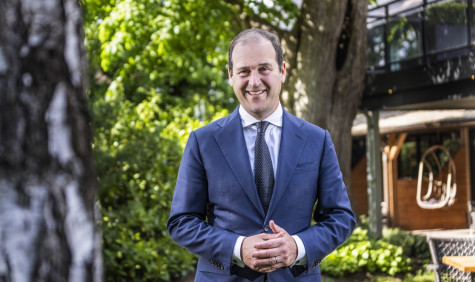Lodewijk Asscher: "Keep pulling together"
How do you govern an ambitious and complex accelerator programme? Chair of the steering committee of the National Growth Fund programme Npuls Lodewijk Asscher has strong ideas about this: "Let's not deny the differences in interests. The way forward lies in content and in the conversation we have about it."
Asscher goes on to explain: "When I started studying Psychology at the University of Amsterdam in 1992, I found myself in a crowded, massive environment. We had lectures in the Lutheran Church. It was often packed, so I sometimes had to follow the lectures in another room via a video link. You could call that online education, but in its worst form. Of course, we are much further on now, but I think it can be even better and more beautiful."

Asscher, who has been chair of the Npuls steering committee since January 2023, is emphatically concerned with the future of our digital education.
"When I look at our eldest son's subjects and forms of collaboration," Asscher continues enthusiastically, "I find it very inspiring. He is in his fifth year at secondary school and is interested in Liberal Arts and Sciences, a multidisciplinary curriculum offered by several universities.
In this programme, they teach in a very modern way. Not with subjects like Geography, History or Dutch, but with lessons that capture the imagination and bring together different disciplines. Global Poverty and Environment is such a new subject.
The workforce is changing rapidly, as are the demands on those in work. It would be great if we prepared tomorrow's students for this in an optimal learning culture. And that includes the tools that support this."
Inclusiveness
Npuls was launched to boost the quality of education, increase agility and improve the digital skills of teachers and students. What was it that appealed to Lodewijk Asscher to take up the role of chair?
"I think it is important that our valuable, publicly funded education system can continue to fulfil its social role in the future. It is the task of education to prepare young people for citizenship so that they can make an appropriate contribution to society. And to instil a learning attitude in young people."
"How do we regulate AI and shape it in a way that suits education? These are typical Npuls topics."
To say that education is changing fast is an understatement. Before the interview with Asscher has really got started, the words 'AI' and 'ChatGPT' have already been dropped.
"Artificial intelligence is not going away anymore. That is evident. I see that with my children. They already know how to use it well. However, this does not mean that we should capitulate immediately. As a society, you can set requirements or conditions on how institutions, while preserving our public values, can make a giant leap forward.
How do we regulate AI and shape it in a way that suits education? These are typical Npuls topics. Moreover, I would be delighted to promote equity. To ensure that digitalisation makes society more inclusive. We reduce differences instead of increasing them."
Eyes and ears
The Npuls programme is an eight-year track. That's quite a commitment for someone with a busy schedule and many different clients.
"I look at that very practically. What goes for my commitment applies to everything in life; you do your best. As long as it is useful, I will continue with it. In the steering committee are prominent administrators from different education sectors and the CEO of SURF. There is no guarantee that we will keep them on board for eight years. However, the long-term perspective is important. We want to show that this is not just another 'project'. Npuls is an ambitious programme that should bring about big change."

Asked about the bandwidth in responsibilities as president, Lodewijk Asscher surveys many different perspectives by taking a 'helicopter view'.
"As befits large growth fund initiatives, I take an independent look at securing the quality of the content and the administrative commitment from the institutions. The steering committee must ensure that the changes are embraced and applied. For this, we want to have the right eyes and ears in the field.
My role is to monitor the process and ensure that all relevant stakeholders, such as the ministry, are included. We want to drive qualitative ambitions and ensure that students also feel heard."
Poldering takes time
The greater the ambitions and number of participants involved, the greater the challenges. For instance, the educational and ICT issues at MBO institutions regularly differ from those from, say, of the university world.
"That is true, but we are not starting from 'zero'. Many cross-sector successes have already been achieved, which is largely due to SURF. Let's embrace the success and learn from it. Npuls requires a degree of curiosity from all administrators involved.
Sometimes you run the risk that everyone starts explaining to each other 'how to do it' or someone says we should 'follow the example of one particular institution.' That is not so fruitful and it eats up energy. When discussing each other's interests, an open attitude is essential.
There are always interests that are different for institutions, organisations, customers and individuals. That is nothing new. We can best deal with that. Open communication gets you further and keeps the momentum going. Map the differences and be curious about the interests of others."
"When discussing each other's interests, an open attitude is essential."
As an independent chair, Lodewijk Asscher is not affiliated with SURF, MBO Raad, VH or UNL. How will the Npuls staff and administrators recognise his hand in the coming years?
"One of my maxims is that, above all else, it should not be about Lodewijk Asscher. I do not pursue personal goals. However, I do try to bring in my experience from 20 years of board work at a high political level. Npuls is made possible with public money. I hope we therefore continue to reason from the public interest and with an eye on the impact for society. Let's not avoid discussions, let's dare to make mistakes. But don't make the same mistakes twice and let's keep pulling together."
"Try to understand why institutions do or don't do something. Why change does or does not catch on. And then move on."
"When you are dealing with many different stakeholders and interests, there is no point in denying those interests. It also makes no sense to look for a strong leader or someone to take the key decisions. The way forward lies in substance and in the conversation we have about it. Poldering sometimes takes time but still delivers effective change strategies in the Netherlands."
"Be curious. Try to understand why institutions do or don't do something. Look at why change does or doesn't catch on. And then move on. If that doesn't work, if there is a problem that cannot be solved, try to escalate in time. Make sure it doesn't get so big you can no longer get a grip on it. When you raise the alarm in time, there is always someone who can help."
Another world
"Talking about procedures and governance is like doing the dishes," Asscher says. "Sometimes you can't get away from it. But in the end, the programme is about substantive change. I would like the steering committee to talk about precisely that. This will keep energy in the programme. Show what we are proud of. Celebrate the successes together. These are elements I will pay keen attention to."

The question remains: when will Lodewijk Asscher's Npuls programme be successful?
"I cannot answer that fully. In our application, we outlined to the ministry what we want to achieve. If you lift the ambitions to a higher level, then I hope that the student who graduates from high school in ten years' time will end up in a different world. A world in which we have not only sustained the strength of publicly funded education, but built on it."
"For the student of tomorrow, I hope for a world governed by public values, and not by commercial interests. That far-reaching digitalisation is used to its full potential and that we continuously explore opportunities to expand our knowledge. This is how we ensure future generations who can take our country forward."
Text: Edwin Ammerlaan
Portrait photo header: Studio38
Dr Lodewijk Asscher (born in Amsterdam in 1974)
2022 - present Partner at consultancy firm Van de Bunt and chair of the Efficiency Task Force at the Collaboration Organisation for Vocational Education and Training Industry.
2017 - 2021 Member of the House of Representatives for the PvdA
2012 - 2017 Deputy Prime Minister and Minister of Social Affairs and Employment in the Rutte II cabinet.
2006 - 2012 Alderman of Amsterdam (in charge of finance, education and youth policy since 2010).
In addition to his work at Van de Bunt, he advises the European Commission on the reception of Ukrainian refugees. Asscher is also chair of the Supervisory Board of the Amsterdam Public Library and the Muziekgebouw aan 't IJ and chair of the National Sports Commemoration Committee.
On 1 January 2023, Lodewijk Asscher started at Npuls. [insert link: https://npuls.nl/inrichting-npuls/] of Npuls. In his role as chair, he leads the steering committee that includes SURF. For more information: www.npuls.nl
